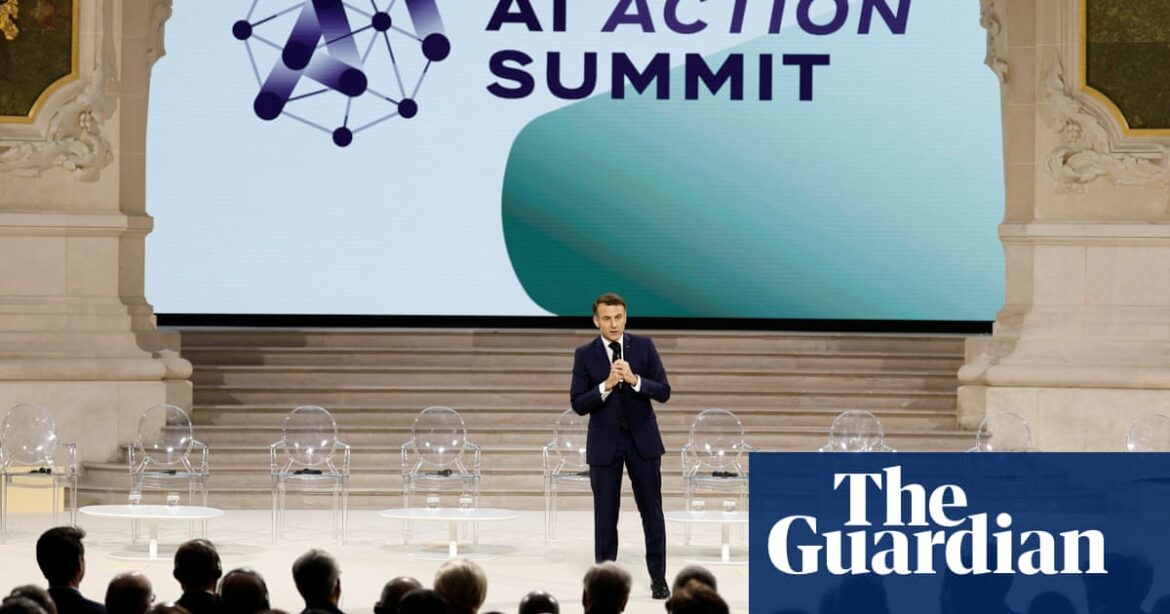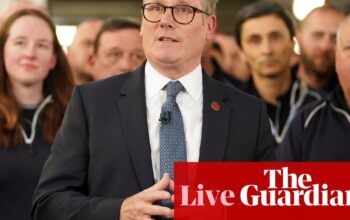
The US and the UK have refused to sign a declaration on “inclusive and sustainable” artificial intelligence at a landmark Paris summit, in a blow to hopes for a concerted approach to developing and regulating the technology.
The communique states that priorities include “ensuring AI is open, inclusive, transparent, ethical, safe, secure and trustworthy, taking into account international frameworks for all” and “making AI sustainable for people and the planet”.
The document was backed by 60 other signatories on Tuesday, including France, China, India, Japan, Australia and Canada. The US and UK did not immediately explain their reasons for refusing to sign.
The UK prime minister’s spokesperson said France was one of Britain’s closest partners in AI, but the government would “only ever sign up to initiatives that are in UK national interests”.
Confirmation of the snub came soon after the US vice-president, JD Vance, took to the stage at the Grand Palais to criticise Europe’s “excessive regulation” of technology and warn against cooperating with China.
Asked if Britain had declined to sign because it wanted to follow the US lead, Keir Starmer’s spokesperson said they were “not aware of the US reasons or position” on the declaration. They added that the UK had signed up to the summit’s coalition for sustainable AI and had backed a statement on cybersecurity.
A government source said the declaration wasn’t strong enough on security and did not reflect the UK’s approach as a country. They rejected the suggestion that Britain was trying to curry favour with the US.
But a Labour MP said: “I think we have little strategic room but to be downstream of the US.” They added that US AI firms could stop engaging with UK regulators if Britain was perceived to be taking an overly restrictive approach to the development of the technology.
Campaign groups criticised the UK’s decision and said it risked damaging its reputation in this area. Andrew Dudfield, the head of AI at Full Fact, said the UK risked “undercutting its hard-won credibility as a world leader for safe, ethical and trustworthy AI innovation” and that there needed to be “bolder government action to protect people from corrosive AI-generated misinformation”.
The Élysée Palace said more countries might sign the declaration in the hours after the two-day summit.
Vance’s speech, in front of leaders including the French president, Emmanuel Macron, and the Indian prime minister, Narendra Modi, indicated dissatisfaction with the global approach to regulating and developing the technology. Starmer did not attend the summit.
Vance, in his first trip abroad as US vice-president, issued a caution against the EU’s regulatory approach, stating that “excessive regulation of the AI sector could kill a transformative industry”.
after newsletter promotion
He added: “We need international regulatory regimes that foster the creation of AI technology rather than strangle it, and we need our European friends, in particular, to look to this new frontier with optimism rather than trepidation.”
Two other EU regulatory measures, the Digital Services Act (DSA) and GDPR, also received passing criticism from Vance. Singling out the DSA, which regulates social media, the vice-president said: “It is one thing to prevent a predator from preying on a child on the internet. And it is something quite different to prevent a grown man or woman from accessing an opinion that the government thinks is misinformation.”
Vance also referred to the risks of partnering with “authoritarian” regimes, a pointed allusion to China. Referring to exports of CCTV and 5G equipment – key Chinese tech products – by authoritarian governments, he said there was a cost: “Partnering with such regimes, it never pays off in the long term.”
As the Chinese vice-premier, Zhang Guoqing, sat yards away, Vance added: “Some of us in this room have learned from experience partnering with them means chaining your nation to an authoritarian master that seeks to infiltrate, dig in and seize your information infrastructure. Should a deal seem too good to be true, just remember the old adage that we learned in Silicon Valley, if you aren’t paying for the product: you are the product.”
Vance started his speech by cautioning against an excessive focus on safety, in an apparent criticism of the first global AI summit in the UK in 2023, which was badged as the AI Safety Summit. He indicated that he thought the Bletchley Park meeting was too cautious, referring to gatherings about cutting-edge technology that can be “too self-conscious, too risk averse”.
Source: theguardian.com



